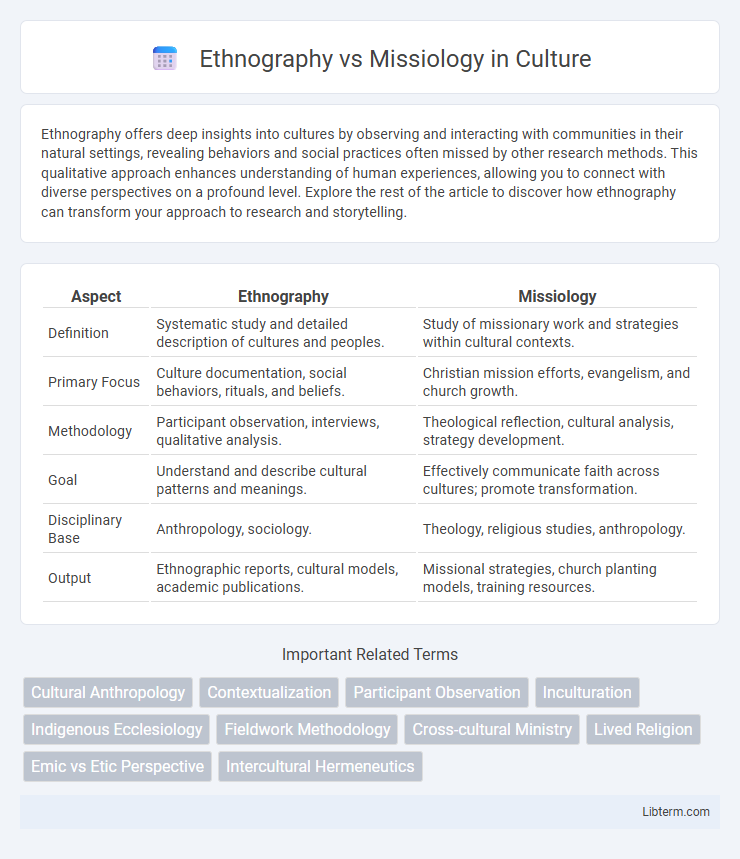Ethnography offers deep insights into cultures by observing and interacting with communities in their natural settings, revealing behaviors and social practices often missed by other research methods. This qualitative approach enhances understanding of human experiences, allowing you to connect with diverse perspectives on a profound level. Explore the rest of the article to discover how ethnography can transform your approach to research and storytelling.
Table of Comparison
| Aspect | Ethnography | Missiology |
|---|---|---|
| Definition | Systematic study and detailed description of cultures and peoples. | Study of missionary work and strategies within cultural contexts. |
| Primary Focus | Culture documentation, social behaviors, rituals, and beliefs. | Christian mission efforts, evangelism, and church growth. |
| Methodology | Participant observation, interviews, qualitative analysis. | Theological reflection, cultural analysis, strategy development. |
| Goal | Understand and describe cultural patterns and meanings. | Effectively communicate faith across cultures; promote transformation. |
| Disciplinary Base | Anthropology, sociology. | Theology, religious studies, anthropology. |
| Output | Ethnographic reports, cultural models, academic publications. | Missional strategies, church planting models, training resources. |
Introduction to Ethnography and Missiology
Ethnography involves the systematic study of people and cultures through immersive observation and qualitative research methods, aiming to understand social practices and beliefs within their natural context. Missiology, the academic discipline focused on the theory and practice of Christian missions, incorporates ethnographic insights to effectively engage diverse cultural groups in religious outreach. By integrating ethnographic methodologies, missiology enhances its understanding of cultural dynamics, enabling more culturally sensitive and effective mission strategies.
Defining Ethnography: Methods and Scope
Ethnography involves immersive fieldwork methods such as participant observation and in-depth interviews to understand cultural practices, beliefs, and social interactions within specific communities. Its scope encompasses detailed descriptions and analyses of everyday life and social organization, aiming to provide holistic insights into human behavior and cultural meanings. In contrast, missiology focuses on the theological study of Christian mission work, emphasizing the strategies and impacts of spreading religious belief rather than purely cultural documentation.
Understanding Missiology: Purpose and Focus
Missiology centers on the study and practice of spreading religious faith, emphasizing the theological, cultural, and strategic aspects of missionary work. It explores the purpose of mission efforts, including evangelism, discipleship, and church planting within diverse cultural contexts. Understanding missiology involves analyzing methods for effective communication of religious beliefs, contextualizing theology, and addressing the challenges of cultural adaptation in global mission fields.
Historical Development of Both Fields
Ethnography originated in the 19th century as a method within anthropology for systematically studying and describing cultures through immersive fieldwork, evolving with contributions from scholars like Bronislaw Malinowski. Missiology developed as a distinct academic discipline in the early 20th century, shaped by missionary activities and theological reflections on the Christian mission's history and methodology. Both fields intersect in their historical development by emphasizing contextual understanding, yet ethnography prioritizes cultural description while missiology focuses on religious propagation and cross-cultural mission strategies.
Key Methodologies: Comparing Approaches
Ethnography employs immersive fieldwork, participant observation, and qualitative interviews to understand cultural practices and social interactions within communities. Missiology combines theological analysis, historical research, and contextual engagement to study the spread and impact of religious missions in various cultural settings. Both methodologies prioritize cultural sensitivity but differ in focus; ethnography centers on descriptive cultural insight while missiology emphasizes strategic religious communication and conversion outcomes.
Goals and Outcomes: Contrasting Priorities
Ethnography aims to comprehensively understand and document the cultural practices, social behaviors, and belief systems of specific communities, prioritizing accurate representation and cultural context. Missiology focuses on the strategic propagation of religious beliefs and the transformation of communities through faith-based initiatives, emphasizing spiritual growth and conversion outcomes. These contrasting priorities shape their goals, with ethnography seeking cultural insight and preservation while missiology targets evangelism and religious influence.
The Role of Culture in Ethnography and Missiology
Ethnography deeply investigates cultural practices, beliefs, and social interactions to understand a community's worldview and behaviors in their natural context. Missiology applies cultural insights from ethnography to develop effective strategies for cross-cultural evangelism, ensuring respectful communication and contextualized theological interpretations. Recognizing the dynamic role of culture helps both disciplines promote meaningful engagement without imposing external values.
Ethical Considerations in Practice
Ethical considerations in ethnography and missiology center on respect for cultural integrity and informed consent, ensuring that research and missionary efforts do not exploit or misrepresent communities. Ethnographers emphasize participant observation with sensitivity to privacy and the avoidance of harm, while missiologists balance evangelistic goals with cultural respect and the ethical implications of conversion. Both fields require transparency, ongoing dialogue with local populations, and adherence to ethical guidelines to uphold dignity and mutual understanding.
Intersections and Divergences: Bridging the Gap
Ethnography and missiology intersect in their emphasis on understanding cultural contexts to effectively communicate religious messages, utilizing qualitative methods like participant observation and interviews. Divergences arise as ethnography prioritizes objective cultural analysis without prescriptive goals, whereas missiology applies ethnographic insights with an evangelistic purpose aimed at spiritual transformation. Bridging this gap requires integrating ethnographic rigor with missiological intent to create culturally sensitive strategies for faith engagement and cross-cultural dialogue.
Implications for Global Mission Work
Ethnography provides detailed cultural insights and context-specific data crucial for effective global mission work, enabling missionaries to understand and respect local traditions and social dynamics. Missiology applies these insights to develop strategic, culturally sensitive approaches that facilitate meaningful engagement and sustainable church growth in diverse communities. Integrating ethnographic methods into missiology enhances cross-cultural communication, minimizes ethnocentric biases, and improves the impact of global mission efforts.
Ethnography Infographic

 libterm.com
libterm.com